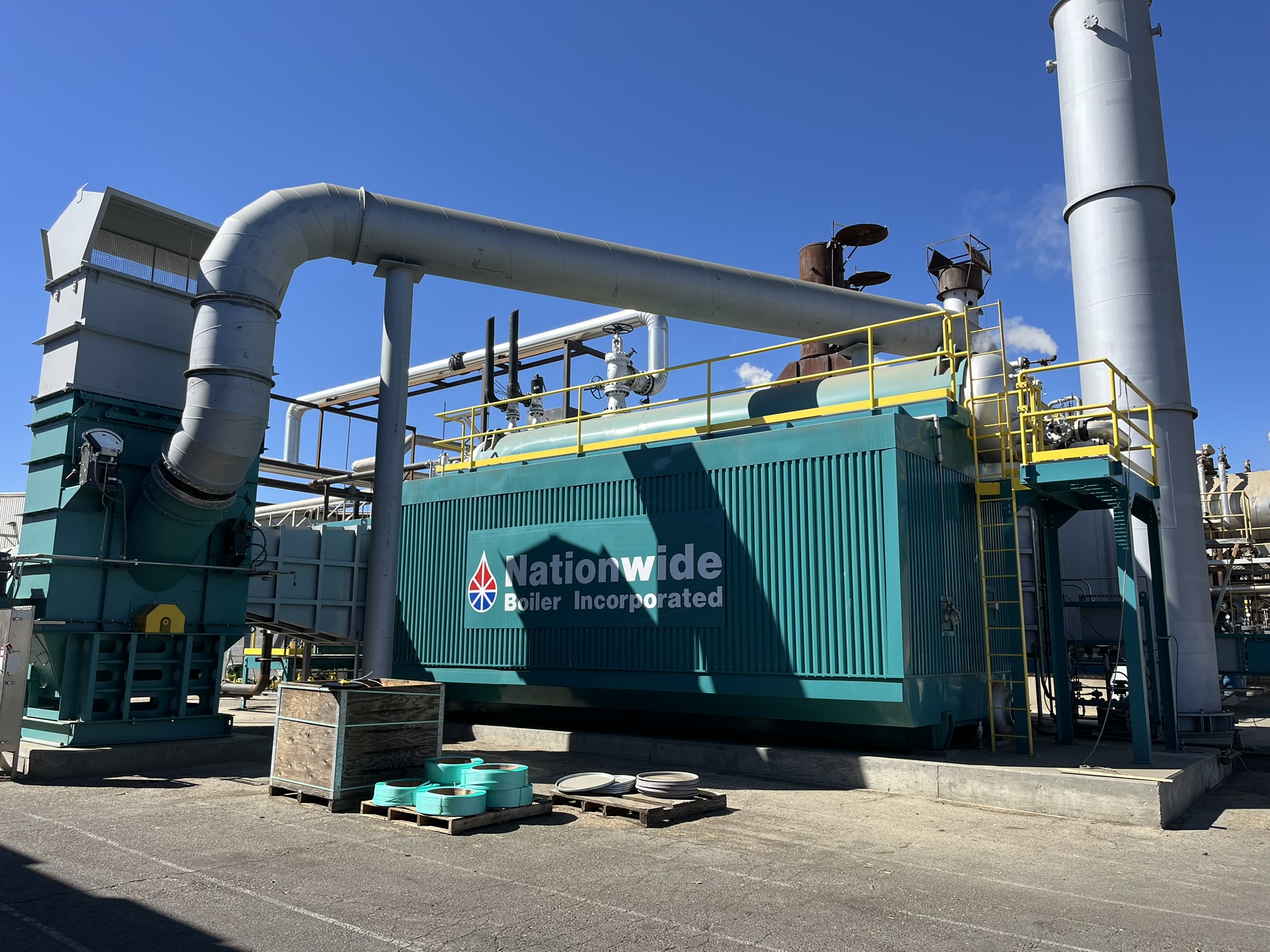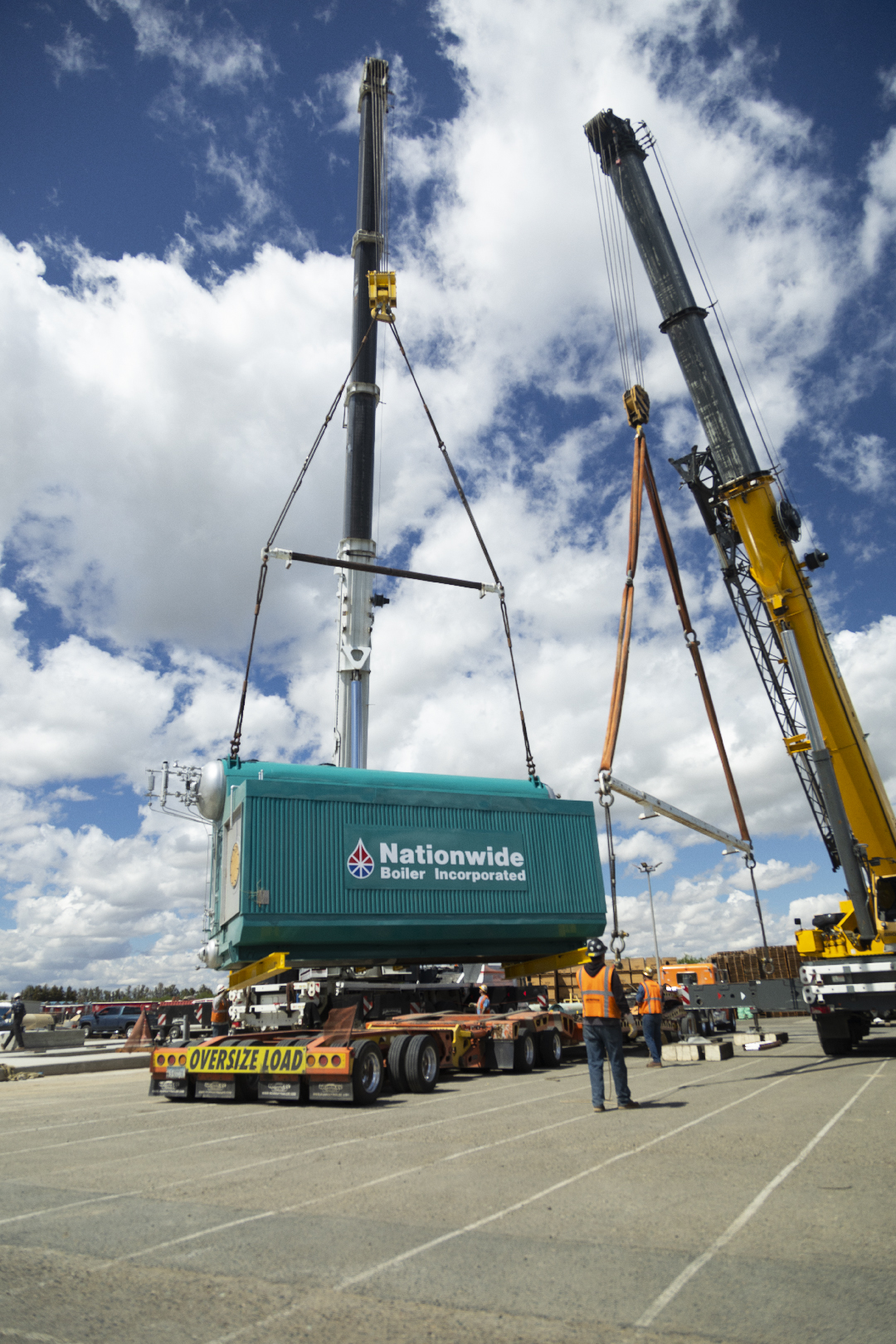At Nationwide Boiler, we’ve spent more than four decades helping industries meet demanding emissions requirements with solutions that deliver reliability, performance, and proven results. Our CataStak™ Selective Catalytic Reduction (SCR) System is one of those solutions—engineered to achieve ultra-low, single-digit NOx emissions on package boilers and a wide range of fired equipment. As air-quality regulations continue to tighten, understanding NOx and the importance of emissions control is more critical than ever.
What Is NOx?
NOx, or nitrogen oxides, represents a group of highly reactive gases formed when nitrogen and oxygen combine during high-temperature combustion. These emissions are common in industrial boilers and fired equipment, including:
- Package boilers
- Fired heaters
- Gas turbines
- Heat recovery steam generators
The amount of NOx produced depends on several operational factors:
- Fuel type
- Burner design
- Peak combustion temperature
- System configuration
- Use of emissions-control technology such as an SCR
Why Reducing NOx Emissions Matters
Once released into the atmosphere, NOx contributes to a series of reactions that impact both environmental quality and human health. Even at low concentrations, these gases can significantly affect regional air quality.
- Ground-Level Ozone (Smog)
NOx reacts with volatile organic compounds (VOCs) in the presence of sunlight to form ground-level ozone—a major component of smog. Unlike the protective ozone layer, this type of ozone is harmful, contributing to crop damage, reduced visibility, and stressed vegetation.
- Acid Rain Formation
When NOx combines with moisture in the atmosphere, it forms nitric acid, a leading cause of acid rain. Acid rain can accelerate the deterioration of buildings, deplete soil nutrients, and disrupt lakes and streams.
- Water Quality Concerns
Nitrogen compounds from NOx emissions can wash into waterways, fueling algae growth. These algal blooms reduce oxygen levels, harm aquatic life, and create lasting ecological imbalances.
- Climate Influence
While NOx itself is not a greenhouse gas, it contributes indirectly to climate change by forming ground-level ozone, which is considered a greenhouse gas. Reducing NOx helps minimize an operation’s overall environmental footprint.
- Human Health Considerations
Exposure to NOx can irritate the respiratory system and worsen existing lung conditions. Elevated levels may increase asthma attacks, aggravate bronchitis, and reduce overall lung function. Children, older adults, and individuals with respiratory sensitivities face the greatest risk.
Since the early days of federal emissions legislation, Nationwide Boiler has been a trusted partner in helping facilities meet—and exceed—air-quality requirements. Our team provides engineered solutions tailored to each application, supporting reliable performance and long-term compliance.
For operations that require deeper emissions reduction or consistent performance across a wide operating range, our CataStak™ SCR System delivers emissions compliance without compromise. The CataStak has been proven across hundreds of installations on boilers and fired equipment in demanding industrial environments. Its modular design supports both ammonia and urea-based reagent systems, allowing facilities to choose the solution that best aligns with their operational and safety requirements. With horizontal and vertical configurations, the CataStak can be engineered to fit a wide variety of system layouts, space constraints, and performance needs. Regardless of the application, the result is the same: reliable, near-zero NOx emissions and a system built for long-term, cost-effective operation.
Ultra-low NOx burners are another viable option, designed to minimize NOx formation at the source by optimizing air–fuel mixing and reducing peak combustion temperatures. These burners have consistently demonstrated the ability to achieve ultra low NOx emissions, as low as 5 ppm in many firetube boiler applications. Through ongoing research and development, we’ve also seen promising results at even lower levels in select operating conditions—particularly on smaller firetube boiler systems. While these advancements continue to be refined, they highlight the potential for future solutions that push emissions performance even further.
And lastly, for facilities looking to eliminate combustion-related emissions entirely, electric steam boilers offer a viable, zero-emissions-at-the-source alternative. Because they operate without fossil fuels, electric boilers do not produce NOx, CO, or greenhouse gases at the point of use. While they are not the right fit for every application—particularly where high steam capacities are required—they can be an effective option in regions with clean, reliable electricity or for processes with strict emissions or permitting requirements.
Nationwide Boiler remains committed to helping facilities operate cleaner, more efficiently, and more sustainably. Our decades of experience—and the proven performance of our environmental solutions—ensure that your operation can meet today’s air-quality standards and future requirements with confidence.
Originally posted in July 2017, this blog has been updated to reflect current information and evolving air-quality regulations.



 When timing is everything, Nationwide Boiler's in-stock boiler program delivers the solutions today’s industry demands. In 2025, ourteam successfully delivered a fast-track project including a 180,000 lb/hr, 500 psig B&W package watertube boiler with CataStak™ SCR system to a major West Coast food processing plant, overcoming logistical and regulatory challenges to keep production on track.
When timing is everything, Nationwide Boiler's in-stock boiler program delivers the solutions today’s industry demands. In 2025, ourteam successfully delivered a fast-track project including a 180,000 lb/hr, 500 psig B&W package watertube boiler with CataStak™ SCR system to a major West Coast food processing plant, overcoming logistical and regulatory challenges to keep production on track. ximize operating flexibility.
ximize operating flexibility.
 Leadership, Recognition, and Looking Ahead
Leadership, Recognition, and Looking Ahead